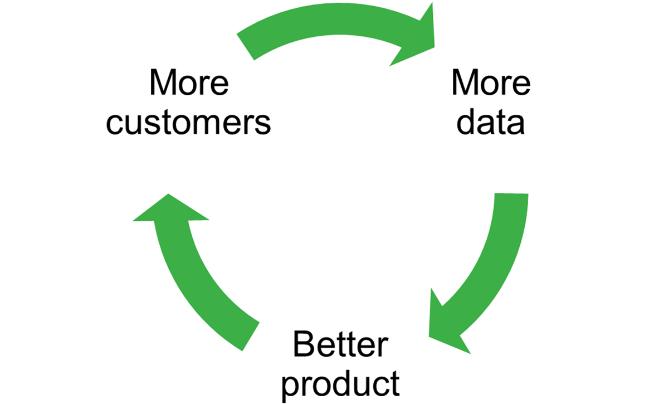
5 minute read
Data Create a Competitive Advantage for Marketer
ecently, marketing has undergone a significant transformation. Marketers nowadays rely mostly on data driven approaches. Data-driven approaches in marketing are the core of today's marketing tactics, and they're a must if you want to provide the personalised experience that customers want. What does this mean for your company and how can you use it to your advantage? Examine how it can assist your business and how you might use it in your own marketing. Unfortunately, many people are still having difficulty with the data-driven approach. Many people ask us where they may get useful information. Others bemoan the lack of resources. They have no idea how to access, analyse, or compare the data they have.
Strategies of New Marketers:
Advertisement
Many marketers now use data to gain an unbeatable competitive edge over competitors. The more data you have of the customers that will create an offer to make better products or services for them and that will help to acquire new customers as well as retain
Rthe existing customers. Marketers can then collect even more data and, in the same way that businesses with a large network effect do, marginalise your competitors. That whole process is called as customer-data capabilities. There is another form of Data Strategies called data enabled learning. It is much similar to the previous one where in the data acquisition is more likely to be on digitally as more people uses it and eventually, a critical mass of consumers emerges, effectively shutting out competitors. There is a virtuous circle of learning from customers data, A virtuous cycle is a series of events that reinforce each other through a feedback loop, resulting in positive outcomes. Both customer data capabilities and data-enabled learning are required to
achieve the greatest competitive position. And just a few businesses are able to do both.
Data-driven businesses have been
around for a long time. Credit bureaus and information aggregators, for example, face some challenges as a result of the economies of scale
involved in acquiring and structuring massive amounts of data, but their business models do not include
gleaning data from customers and mining it to understand how to improve offerings. Customer data collection and use to
improve products and services is an age-old technique, but it used to be slow, limited in scope, and difficult to scale up. It involved calculating sales data, conducting customer surveys, and convening focus groups for automobiles, consumer packaged goods businesses, and many other traditional manufacturers. However, sales data was frequently unlinked from individual consumers, and because surveys and focus groups were costly and time-consuming, only a tiny number of customers' data was
obtained.
With the introduction of the cloud and
new technology, this changed substantially, allowing businesses to swiftly analyse and make sense of massive amounts of data. Customers'
personal information, search behaviour, content preferences, conversations, social network posts, GPS position, and usage patterns can now be collected directly by Internetconnected products and services. Following the analysis of this "digital exhaust" by machine-learning algorithms, a company's offerings can be automatically changed to reflect the findings and even personalised to people.
The advantages of using data in marketing:
In marketing, data comprises gathering, analysing, and using massive amounts of digital information to improve business operations and helps marketers make better decisions. Decisions that, in turn, deliver far greater results, and do it faster. Following are the few points that marketers can benefit from the data in
other ways too.
a. Target the right audience
Data assists in gaining a better understanding of the target audience. Marketers can obtain a better
understanding of their target audience by collecting any information about them. For instance, the term "know your customer" (KYC) was coined many years ago to avoid bank fraud. KYC
gives information about customer behaviour that was previously only available to large financial firms. CRM data, for example, can improve a marketer's ability to predict customer behaviour even more.
As a result, marketing programmes are developed that ensure clients receive the right message at the right time.
b. Build connection with potential customers
Data gives you the power to form stronger bonds with potential consumers. Marketers may use data to create much stronger connections with their target audiences. Furthermore, they can do so on a large scale.
c. Product Development
Data helps in the process of product development. Connectivity components are increasingly included in many products, in addition to mechanical and electrical
components. Connected products create a feedback loop by providing manufacturers with data on how to use
their devices. Such information allows
manufacturers to have a better
understanding of how items are used, which could lead to the development of products that are more suited to their intended use.
Before you launch, data may help you understand the needs, pain areas, and desires of your target audience. You'll have more product success if you customise the value and features of
your products to match what customers want.
d. Brand Awareness
Brand awareness is generally the first step in achieving performance marketing objectives such as leads and sales. Increase brand awareness by targeting relevant, high-quality audiences, and you'll have a better chance of converting customers and dominating your market. You may learn about website traffic, bounce rates, social media performance, and many other elements by using big data technologies.
You can discover what works
effectively in terms of awareness while also identifying features that need to be improved significantly.
e. Personalisation
Relevance and timeliness are essential
components of successful marketing. Customers today are sceptical of generic marketing messages they get. As a result, marketers must focus on personalising customers' experiences in order to engage them. Here's how data can help you get there. For starters, it provides comprehensive overview of the target audience. It facilitates in the identification of
potential customers' pain areas and triggers. Individual customer information, on the other hand, can enhance a brand's communication with an
individual.
f. Customer Acquisitions
Another significant benefit of big data in marketing is improved customer acquisition. Using the cloud to collect and analyse consistent and personalised data from a variety of sources, including the web, mobile applications, email, live chat, and even in-store interactions, is possible. Data can also be used by marketers to find new customers. For example, if your customer watches video material more frequently than they read blog entries, you can pull that information from the data
management platform and use it to create a tool that recommends
more video content to them.
Alternatively, if you know a consumer enjoys handbags, you might propose these as a recommended purchase rather than something they don't want.

ABHIJEET DAS MBA 2020 - 2022








